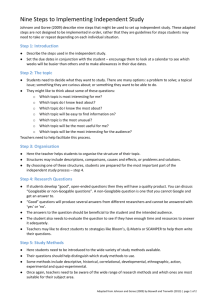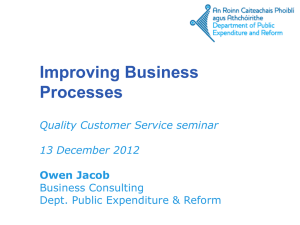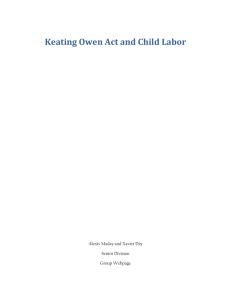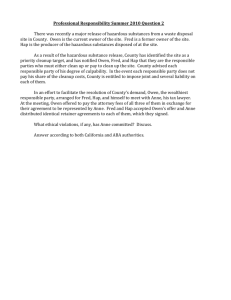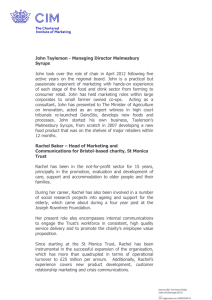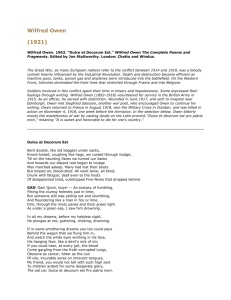NORTH CAROLINA INDUSTRIAL COMMISSION
advertisement
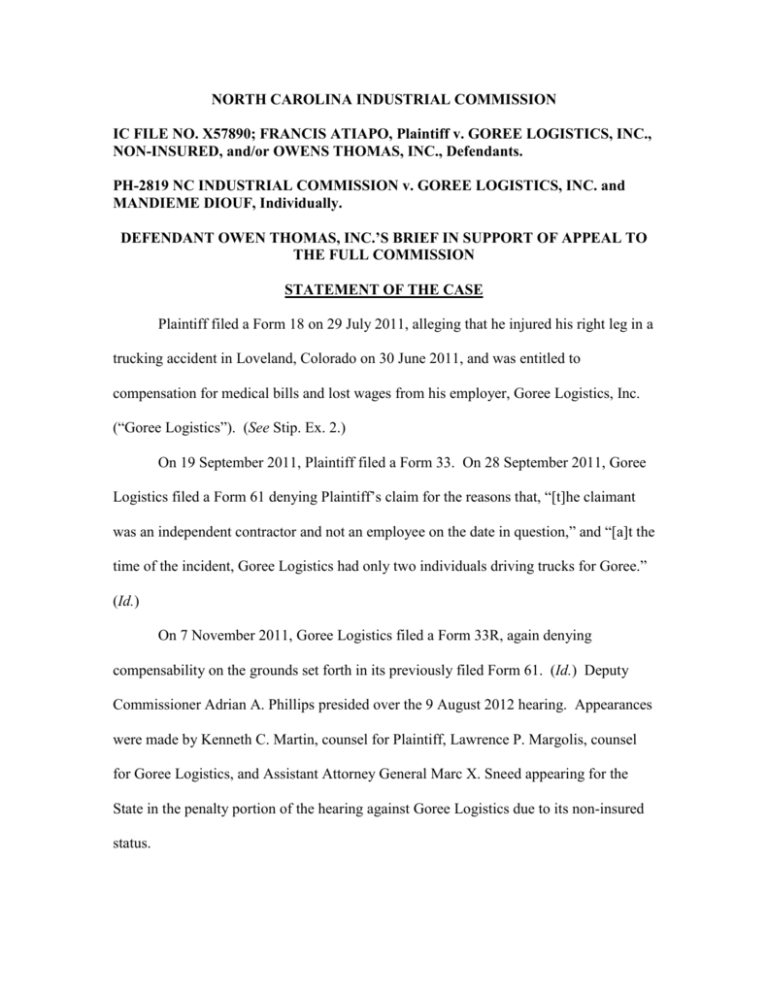
NORTH CAROLINA INDUSTRIAL COMMISSION IC FILE NO. X57890; FRANCIS ATIAPO, Plaintiff v. GOREE LOGISTICS, INC., NON-INSURED, and/or OWENS THOMAS, INC., Defendants. PH-2819 NC INDUSTRIAL COMMISSION v. GOREE LOGISTICS, INC. and MANDIEME DIOUF, Individually. DEFENDANT OWEN THOMAS, INC.’S BRIEF IN SUPPORT OF APPEAL TO THE FULL COMMISSION STATEMENT OF THE CASE Plaintiff filed a Form 18 on 29 July 2011, alleging that he injured his right leg in a trucking accident in Loveland, Colorado on 30 June 2011, and was entitled to compensation for medical bills and lost wages from his employer, Goree Logistics, Inc. (“Goree Logistics”). (See Stip. Ex. 2.) On 19 September 2011, Plaintiff filed a Form 33. On 28 September 2011, Goree Logistics filed a Form 61 denying Plaintiff’s claim for the reasons that, “[t]he claimant was an independent contractor and not an employee on the date in question,” and “[a]t the time of the incident, Goree Logistics had only two individuals driving trucks for Goree.” (Id.) On 7 November 2011, Goree Logistics filed a Form 33R, again denying compensability on the grounds set forth in its previously filed Form 61. (Id.) Deputy Commissioner Adrian A. Phillips presided over the 9 August 2012 hearing. Appearances were made by Kenneth C. Martin, counsel for Plaintiff, Lawrence P. Margolis, counsel for Goree Logistics, and Assistant Attorney General Marc X. Sneed appearing for the State in the penalty portion of the hearing against Goree Logistics due to its non-insured status. At the 9 August 2012 hearing, Assistant Attorney General Sneed made a motion to add Owen Thomas, Inc. (“Owen Thomas”) as a Party-Defendant. Deputy Commissioner Phillips allowed the motion and filed an order on 28 August 2012 adding Owen Thomas to the claim portion of the proceeding.1 A second hearing was scheduled for 16 November 2012. Undersigned counsel filed notice of appearance for Owen Thomas on 24 October 2012, and on 25 October 2012 moved for a continuance of the 16 November 2012 hearing for additional time to conduct discovery. Deputy Commissioner Phillips allowed the motion. A hearing was held on 1 March 2013, with appearances by Mr. Martin, Mr. Margolis, undersigned counsel, and Assistant Attorney General Sneed. Testimony was received from Plaintiff Francis Atiapo, Defendant Mandieme Diouf for Goree Logistics, and John Thomas Grimes for Owen Thomas. On 26 July 2013, Deputy Commissioner Phillips filed her Opinion and Award, which held that Plaintiff’s injuries were compensable and that Owen Thomas was a statutory employer within the meaning of N.C. Gen. Stat. §97-19, and thus liable to Plaintiff for any and all medical expenses related to the compensable injuries, as well as temporary total disability compensation. The Opinion and Award also imposed penalties against Goree Logistics as a non-insured employer and Madieme Diouf, individually. STATEMENT OF THE FACTS I. Plaintiff’s 30 June 2011 Accident Plaintiff and Goree Logistics stipulated in their pre-trial agreement that Plaintiff sustained an injury to his right leg as a result of a trucking accident in Colorado. Plaintiff and Goree Logistics further stipulated that they were bound by the provisions of the 1 Owen Thomas, Inc. is misidentified as “Owens” Thomas, Inc. in the original caption of this matter. 2 North Carolina Workers’ Compensation Act (the “Act”), and that Goree Logistics was not carrying workers’ compensation insurance at the time of the accident. The main contested matter between Plaintiff and Goree Logistics was whether Plaintiff was an independent contractor at the time of the accident, which Goree Logistics contended would exclude Plaintiff from entitlement to benefits. (T. vol. 1 pp. 1:20-3:4.) Plaintiff claimed that he was an employee of Goree Logistics at the time of the accident. (T. vol. 1 p. 5:17-5:22.) Plaintiff further testified that the truck he was driving was owned by Goree Logistic’s president, “Omar” Madieme Diouf. (T. vol. 1 p. 13:19-13:21.) Also, the truck was registered with the Department of Transportation in Mr. Diouf’s name. (T. vol. 1 p. 8:8-8:14.) Plaintiff testified that Mr. Diouf hired him and was his immediate supervisor. (T. vol. 1 p. 6:10-6:16.) Goree Logistics contended at the first hearing that Plaintiff was an independent contractor. Mr. Diouf testified that Plaintiff received a 1099. (T. vol. 1 pp. 53:11-54:5.) Mr. Diouf also testified that Goree Logistics and Plaintiff had signed an agreement indicating that Plaintiff was an independent contractor. (T. vol. 1 pp. 58:22-59:4.) At the time of the accident, Plaintiff was making a delivery in Cheyenne, Wyoming. The customer in Cheyenne refused the load, and Plaintiff was directed by Goree Logistics to bring the truck to Georgia. (T. vol. 1 p. 11:1-11:6; See Stip. Ex. 5, Pl.’s Resp. to Def’s Interrog. 14 and 15; T. vol. 2 p. 30:12-30:23.) On the way to Georgia, Plaintiff was told by Goree Logistics to change course and go to Denver, Colorado. (Id.) It was in route to Denver that Plaintiff came upon a “long backup” of cars at the peak of a hill. When he pressed the brakes, the brakes failed and he collided with the car in front of him. (T. vol. 1 pp. 11:21-12:1.) 3 II. Freight Broker Owen Thomas, Inc. Owen Thomas is a federally-licensed freight broker with its office in Zephyrhills, Florida. (T. vol. 2 pp. 4:15-5:5.) Owen Thomas has customers in the produce industry, like Sunny Ridge Farms2 in the instant case, who sell their produce to various grocery stores, as well as superstores such as Wal-Mart or Costco. (T. vol. 2 pp. 18:18-19:8.) As a freight broker, Owen Thomas’ job is to find motor carriers, like Goree Logistics, to haul those loads of produce for the customer. (Id.) Owen Thomas and Goree Logistics entered into a “Broker-Carrier Agreement” on or about 22 June 2011 (the “Agreement”). (See Stip. Ex. 3.) The Agreement set forth the parameters of Owen Thomas’ relationship with Goree Logistics — specifically, that Owen Thomas is a licensed transportation broker acting on behalf of its customers, and Goree Logistics is a licensed motor carrier (U.S. Dept. of Transportation # 1946972). Section 1 of the Agreement states, “[b]roker is an agent authorized by its customers to negotiate and arrange for transportation of their shipments in interstate commerce.” (emphasis added) In this case, Owen Thomas’ “customer” was Sunny Ridge Farms, and the “shipment” was a load of blueberries being hauled by Plaintiff at the time of the accident. The Agreement further states in section 1.1 that, “[Goree Logistics] has exclusive control and direction of the work [Goree Logistics] performs pursuant to this Agreement and each Transportation Schedule. [Goree Logistics] agrees to assume full responsibility for the payment of all local, state, federal and intra-provincial payroll taxes, and contributions or taxes for unemployment insurance, workers’ compensation…or related protection with respect to the persons engaged by Carrier for Carrier’s performance of the 2 Sunny Ridge Farms is misspelled Sunny “Rich” Farms in the transcript. 4 transportation…” In section 4(c) of the Agreement, Goree Logistics warrants that it “shall maintain workers’ compensation insurance as required by state law.” In Section 4.1 Goree Logistics also guarantees that it will carry workers’ compensation insurance in an amount “no less than the statutory limits for the state(s) or province(s) in which transportation services are to be performed…” It is important to note that no federal law or regulation requires a freight broker like Owen Thomas to obtain proof of a motor carrier’s workers’ compensation insurance. (See Stip. Ex. 3; T. vol. 2 p. 38:15-38:18.) In the case at bar, Sunny Ridge Farms engaged Owen Thomas to find a carrier to deliver a shipment of blueberries to Wal-Mart. Owen Thomas, on behalf of Sunny Ridge, secured the services of Goree Logistics to haul the load of blueberries. As part of that process, Owen Thomas provided Goree Logistics with a “rate confirmation” sheet with certain requirements for Goree Logistics which were necessary to preserve the freshness of the load of blueberries and ensure its safe delivery. (See Stip. Ex. 4.) ARGUMENT I. Deputy Commissioner Phillips Erred in Making Finding of Fact Number Eleven (11) Because It is Not Supported By the Competent and Credible Evidence. In the Opinion and Award, finding of fact eleven (11) states: “At the time of Plaintiff’s injury, Owen Thomas was engaged in the business of moving freight through contracts with freight hauling companies as a regular part of its business.” This finding of fact was based on the following testimony from John Grimes: Q: Does Owen Thomas broker the movement of freight through contracts with freight hauling companies as a regular part of its business? A: Yes, sir. 5 (T. vol. 2 p. 4:25-5:3.) (emphasis added) The testimony of John Grimes was that Owen Thomas brokered the movement of freight through contracts with freight hauling companies as a regular part of its business. Deputy Commissioner Phillips omitted the term “broker” in Finding of Fact eleven (11). Without the term “broker,” this finding of fact implies that Owen Thomas itself has the ability to “move freight.” Owen Thomas does not have the ability to move freight because it has no trucks of its own and is only a broker. (See Stip. Ex. 5, Def.’s Resp. to Pl.’s Interrog. 5.) While this might seem like a subtle distinction, it has great bearing on the legal analysis of whether Owen Thomas was a “statutory employer” in the case at bar. II. Deputy Commissioner Phillips Erred in Making Finding of Fact Fifteen (15) For the Reason That It is Not Supported By the Competent and Credible Evidence. In her Opinion and Award, Deputy Commissioner Phillips’ Finding of Fact fifteen (15) states: Although the Broker-Carrier Agreement provides that Goree Logistics understands and agrees that they are an independent contractor, Owen Thomas maintained control over the performance of Goree Logistics’ work including requiring Goree Logistics to call Owen Thomas at 8 a.m. and 2 p.m. daily. The agreement also required Goree Logistics to pulp product, call with pulp temperatures and write pulp temperatures on the confirmation and bills. The agreement also required Goree Logistics to cooperate with redeliveries and deviations from the original terms of the contract for reasonable compensation. The competent and credible evidence shows that Owen Thomas did not “maintain control” over the performance of Goree Logistics’ work. The fact that Owen Thomas required Goree Logistics to call at certain times, preserve the produce it was hauling, and 6 cooperate when a delivery failed does not mean that Owen Thomas “controlled…the performance of Goree Logistics’ work.” The reason this finding of fact is in error is because Deputy Commissioner Phillips did not make a distinction between the kind of “work” performed by Owen Thomas and the kind of “work” performed by Goree Logistics. The competent and credible evidence shows that Owen Thomas was engaged in the business of being a freight broker at the time of Plaintiff’s injury. In the case at bar, Sunny Ridge Farms hired Owen Thomas as a broker-agent to find a motor carrier to haul Sunny Ridge’s shipment of blueberries. (T. vol. 2 pp. 5:20-5:24; 6:13-6:20; 7:8-7:13; 18:18-19:8.) Owen Thomas did not designate when the produce was going to be picked up and delivered. (T. vol. 2 p. 6:4-6:7.) Owen Thomas did not purchase the produce, sell the produce to the retailers, or schedule the delivery appointment. (T. vol. 2 p. 6:116:20.) With respect to the actual delivery, all Owen Thomas did was communicate delivery information to Goree Logistics for its customer Sunny Ridge. (T. vol. 2 p. 6:206:22.) Plaintiff’s testimony corroborates the limited role played by Owen Thomas. Plaintiff testified that he never had any contact or communication with Owen Thomas; that all of his communication was with Goree Logistics; and simply put, that he “got [his] orders from Goree Logistics.” (T. vol. 2 p. 33:2-34:1.) Furthermore, Owen Thomas does not employ drivers. (See Stip. Ex. 5, Def.’s Resp. to Pl.’s Interrog. 5.) Making deliveries like the one during which Plaintiff was injured are not “part of the regular business” of Owen Thomas. 7 Thus, Owen Thomas’ “work” was to find a motor carrier like Goree Logistics to ship produce for a customer like Sunny Ridge Farms. A natural extension of this role was to communicate information so that the blueberries made it to the retailer in a fresh condition. The requirements in the “rate confirmation sheet” were present so that Owen Thomas could, in turn, fulfill its brokerage obligations to Sunny Ridge. As John Grimes testified with respect to the requirement of periodic updates: “[W]e are required by Sunny Ridge and most of our customers to provide periodic updates on the status of their freight that’s being shipped. And so it’s simply a way that we have for the carrier to contact us so that we can further communicate that to the customer.” (T. vol. 2 13:19-14:5.) Goree Logistics’ “work,” on the other hand, was that of a motor carrier. A motor carrier is defined by the Federal Motor Carrier Safety Administration (“FMCSA”) as “a person engaged in the transportation of goods or passengers for compensation,” and who is “responsible for hiring, supervising, training, assigning, or dispatching of drivers…”3 The uncontroverted evidence shows that Goree Logistics trained Plaintiff on “all aspects of delivering, i.e. inspections, refrigeration, picking up and delivering loads on time, keeping log books.” (See Stip. Ex. 5; Def. Goree’s resp. to Owen Thomas’ interrog. 13.) The evidence further shows that Goree Logistics provided the truck and assigned the driver (Plaintiff) to haul the load for Sunny Ridge. And according to Goree Logistics, Plaintiff chose the route for delivering the produce. (See Stip. Ex. 5; Def. Goree’s resp. to Owen Thomas’ interrog. 11.) It is to be expected that Owen Thomas would follow-up with Goree Logistics to make sure the customer’s produce was being properly preserved and delivered in good Definitions of “For-Hire Motor Carrier” and “Motor Carrier,” http://www.fmcsa.dot.gov/rulesregulations/administration/fmcsr/fmcsrruletext.aspx?reg=390.5 (last visited 22 September 2013). 3 8 condition, but Owen Thomas did not provide the truck, choose the driver, or choose the route for delivery. Goree Logistics and its driver performed those tasks because that was Goree Logistics’ “work” as a motor carrier and not the work of Owen Thomas, the broker. Therefore, the finding of fact that Owen Thomas “maintained control over the performance of Goree Logistics’ work” is not supported by the competent and credible evidence. III. Deputy Commissioner Phillips Erred in Concluding as a Matter of Law That All Parties Were Properly Before the Industrial Commission, Subject to and Bound by the Provisions of the Act, and the Industrial Commission Had Jurisdiction Over the Parties and the Subject Matter of the Case at Bar. The issue of a plaintiff’s employment status in relation to a defendant is a jurisdictional issue, and the Commission has no jurisdiction to apply the Act to a party not subject to its provisions. See Williams v. ARL, Inc., 133 N.C. App. 625, 628, 516 S.E. 2d 433 (1999) (citing Youngblood v. North State Ford Truck Sales, 321 N.C. 380, 364 S.E.2d 433 (1988)). Deputy Commissioner Phillips held that Owen Thomas had an employer-employee relationship with Plaintiff because it was acting as a statutory employer under N.C. Gen. Stat. § 97-19 and/or N.C. Gen. Stat. § 97-19.1. For the reasons set forth in section IV below, Owen Thomas was not a statutory employer. Therefore, no employer-employee relationship existed between Owen Thomas and Plaintiff, and the Commission lacked jurisdiction as to Owen Thomas. IV. Deputy Commissioner Phillips Erred in Concluding as a Matter of Law that Owen Thomas was a Statutory Employer Under N.C. Gen. Stat. § 97-19 and/or N.C. Gen. Stat. § 97-19.1 for the Reason that Said Conclusion is Not Supported by Findings of Fact Based on the Competent and Credible Evidence. 9 Deputy Commissioner Phillips’ conclusion of law five (5) holds that Owen Thomas was Plaintiff’s statutory employer because it was a “general contractor” that sublet work to its subcontractor Goree Logistics within the meaning of N.C. Gen. Stat. § 97-19. Deputy Commissioner Phillips’ conclusion of law six (6) holds that Owen Thomas is Plaintiff’s statutory employer pursuant to N.C. Gen. Stat. § 97-19.1, which extends the statutory employer provision of § 97-19 to the motor carrier industry. These conclusions of law are based on findings of fact eleven (11) and fifteen (15), which as previously argued are not supported by the competent and credible evidence. Finding of fact eleven (11) implies that Owen Thomas was not acting in its capacity as a broker, and finding of fact fifteen (15) holds that Owen Thomas maintained control over Goree Logistics’ performance of the delivery. The competent and credible evidence, as set forth above, shows that Owen Thomas was acting as a broker-agent in this case, not a general contractor, principal contractor, intermediate contractor, or subcontractor. Deputy Commissioner Phillips erred in concluding as a matter of law that Owen Thomas was a statutory employer because it is well-established law in North Carolina that agents cannot be held liable as statutory employers. Black’s Law Dictionary defines “broker” as “[a]n agent who acts as an intermediary or negotiator, esp. between prospective buyers and sellers; a person employed to make bargains and contracts between other persons in matters of trade, commerce, or navigation. BROKER, Black's Law Dictionary (9th ed. 2009). As discussed above, the evidence in the record shows that Owen Thomas did two things: (1) it found a motor carrier — Goree Logistics — to transport Sunny Ridge’s load of blueberries, and (2) it communicated to Goree Logistics the instructions from Sunny 10 Ridge on the “when and where’s” of the delivery. In other words, it was an “intermediary” in a matter of “trade, commerce, or navigation.” It is stated in Larson’s Workers’ Compensation Law § 70.03 that, “[a]lthough different states use different designations for the person being subjected to statutory employer liability, it is quite common to find such liability confined to “principal” or “general” contractors. Under a strict construction of these designations, courts have sometimes refused to apply the “contractor-under” clause to ‘owner,’ entrepreneurs, agents, and governments…” (emphasis added). With respect to the rule that various states do not hold “agents” liable as statutory employers, Larson’s cites the NC Court of Appeals decision in Cook v. NorvellMackorell Real Estate Co., 99 N.C. App. 307, 392 S.E.2d 758 (1990). In that case, Norvell-Mackorell Real Estate Co. (“Norvell”) was the property manager for an apartment complex. Norvell engaged the injured worker’s employer to repair the apartment building’s roof. Norvell did not obtain proof that the injured worker’s employer was in compliance with N.C. Gen. Stat. § 97-93. Nevertheless, the Commission dismissed the claim for lack of subject matter jurisdiction, holding that Norvell was not a statutory employer because it was an agent for the apartment complex, not a “principal contractor, intermediate contractor, or subcontractor” as required by the “statutory employer” provision. The Court of Appeals affirmed the Commission’s decision. In reaching its conclusion that Norvell was an “agent,” and thus not a “statutory employer,” the Court of Appeals found especially important the fact that Norvell had no contractual obligation to do the repairs itself, only to procure repair services from a 11 contractor. This distinction was significant to the Court because according to the Court, the North Carolina statutory employer statute was enacted “to prevent principal contractors, intermediate contractors, and sub-contractors from relieving themselves of liability under the Act by doing through sub-contractors what they would otherwise do through the agency of direct employees.” Id. at 759 (quoting Withers v. Black, 230 N.C. 428, 53 S.E.2d 668 (1949)) (emphasis added). The purpose of the statutory employer statute — that contractors should not be allowed to hide behind sub-contractors where they could do the job through their own employees — is reiterated in Larson’s, which states that “[p]ractically all of the cases of general interest interpreting this type of statute are addressed to one question: When is the subcontracted work part of the regular business of the statutory employer?” Larson’s § 70.06. With respect to statutory employer “transportation” cases, Larson’s states, “[d]elivery and transportation cases turn largely on common-sense considerations of whether the delivery activity was routine or extraordinary for this type of business.” Id. Owen Thomas does not employ drivers. (See Stip. Ex. 5, Def.’s Resp. to Pl.’s Interrog. 5.) Owen Thomas does not perform deliveries. Therefore, deliveries such as the one during which Plaintiff was injured are not “part of the regular business” of Owen Thomas. North Carolina’s statutory employer statute, as interpreted by our appellate courts, does not apply here because Owen Thomas was not “doing through subcontractors what [it] would otherwise do through the agency of direct employees.” Owen Thomas is in the same position as Norvell. Like Norvell, Owen Thomas acted as an agent for Sunny Ridge Farms in order to find and hire a motor carrier to deliver produce for Sunny Ridge Farms. All of the competent and credible evidence supports this 12 finding. No competent and credible evidence supports a finding that Owen Thomas acted in any other role. V. Deputy Commissioner Phillips Erred by Concluding as a Matter of Law That the Industrial Commission Had Jurisdiction Over Owen Thomas Where Exercising Jurisdiction Over Owen Thomas Violates 49 U.S.C. § 14501(c). Deputy Commissioner Phillips’ Opinion and Award recognizes in Finding of Fact ten (10) that Owen Thomas is a “federally licensed Brokerage Firm for the transportation of freight.” 49 U.S.C. § 14501(c) provides an exception to federal preemption of the regulation of interstate transportation by allowing states to regulate insurance requirements for motor carriers. The section provides, Motor Carriers of Property.— (1) General rule.— Except as provided in paragraphs (2) and (3), a State, political subdivision of a State, or political authority of 2 or more States may not enact or enforce a law, regulation, or other provision having the force and effect of law related to a price, route, or service of any motor carrier…or any private motor carrier, broker, or freight forwarder with respect to the transportation of property. (2) Matters not covered.— Paragraph (1)— (A) shall not restrict the safety regulatory authority of a State with respect to motor vehicles, the authority of a State to impose highway route controls or limitations based on the size or weight of the motor vehicle or the hazardous nature of the cargo, or the authority of a State to regulate motor carriers with regard to minimum amounts of financial responsibility relating to insurance requirements and self-insurance authorization; (emphasis added). The plain language of the above statutory provision indicates that the federal “insurance exception” applies solely to “motor carriers,” and excludes “brokers.” 13 Both “broker” and “motor carrier” are contained in 49 U.S.C. 14501(c)’s general rule restricting state regulation of interstate transportation. However, only the term “motor carrier” is referenced in the exception allowing state regulation of insurance requirements. As the United States Supreme Court has pointed out, it is axiomatic that “a negative inference may be drawn from the exclusion of language from one statutory provision that is included in other provisions of the same statute.” Hamdan v. Rumsfeld, 548 U.S. 557, 578, 126 S.Ct. 2749, 2765, 165 L. Ed.2d 723 (2006). “Where Congress includes particular language in one section of a statute but omits it in another section of the same Act, it is generally presumed that Congress acts intentionally and purposely in the disparate inclusion or exclusion.” Id. (quoting Russello v. United States, 464 U.S. 16, 23, 104 S.Ct. 296, 78 L.Ed.2d 17 (1983)). Although present in the general rule of 49 U.S.C. § 14501(c), the term “broker” has been intentionally excluded from the provision allowing state regulation of insurance requirements for “motor carriers.” A 2 July 2007 advisory opinion by the North Carolina Attorney General, attached hereto, addressed the question: “Does N.C.G.S. § 97-19.1 violate 49 U.S.C. § 14501(c)?” The advisory opinion concluded that § 97-19.1 is not in violation because of the abovementioned exception for regulating insurance requirements for motor carriers. The advisory opinion also shed light on the legislative intent behind § 97-19.1: Section 97-19.1 allows the independent driver to purchase insurance or for the motor carriers up the chain of command to have secured coverage for the truckers below them in the chain. (emphasis added). The General Assembly’s intent according to the Attorney General’s advisory opinion is that § 97-19.1 applies to “motor carriers.” The statute protects truckers 14 beneath “motor carriers up the chain of command.” Owen Thomas is not a part of this figurative chain of command. It is a broker-agent outside the chain, performing the service of finding motor carriers, like Goree, to transport loads for produce suppliers. CONCLUSION Based on the foregoing, Owen Thomas respectfully requests that the Full Commission REVERSE Deputy Commissioner Phillips’ Opinion and Award as it pertains to Defendant Owen Thomas. Respectfully submitted, this the _____ day of September 2013. FERGUSON, SCARBROUGH, HAYES, HAWKINS & DEMAY, P.A.: ____________________________________ JOHN F. SCARBROUGH (Bar No. 41569) 65 McCachern Blvd., S.E. P.O. Box 444 Concord, North Carolina 28026-0444 Telephone: 704-788-3211 Fax: 704-784-3211 johnscarbrough@fspa.net 15 CERTIFICATE OF SERVICE I, John Scarbrough, hereby certify that I have served the foregoing upon all parties of record by mailing a copy thereof by first-class mail, postage pre-paid, to the addresses listed below: Kenneth C. Martin Grandy & Martin 115 East Park Ave. Charlotte, NC 28203 Counsel for Plaintiff Assistant Attorney General Marc X. Sneed North Carolina Department of Justice 4333 Mail Service Center Raleigh, NC 27699-4333 Counsel for the State Lawrence P. Margolis P.O. Box 473323 Charlotte, NC 28247 Counsel for Defendant Goree Logistics, Inc. This, the ____ day of September 2013. FERGUSON, SCARBROUGH, HAYES, HAWKINS & DEMAY, P.A.: ___________________________________________ JOHN F. SCARBROUGH (Bar No. 41569) 65 McCachern Blvd., S.E. P.O. Box 444 Concord, North Carolina 28026-0444 Telephone: 704-788-3211 Fax: 704-784-3211 johnscarbrough@fspa.net 16
